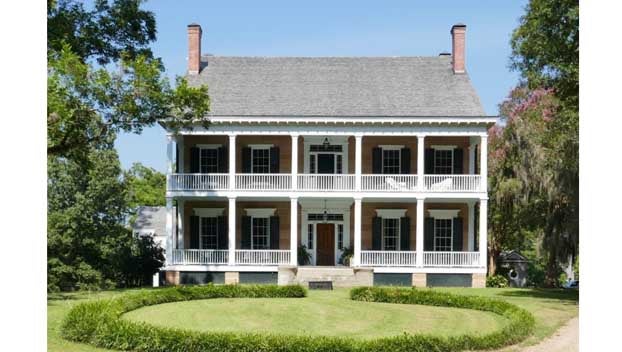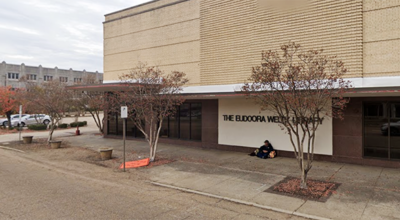Mississippi’s Tate Taylor uses love of historic preservation, talents in film industry to lift Mississippi economy
Published 3:15 pm Tuesday, April 21, 2020
“I’m in beautiful Gretna, Louisiana,” Tate Taylor said, perhaps a note of satisfaction ringing over the phone. He was there directing the Southern Gothic family drama “Filthy Rich” for Fox — a show he also created — just before Christmas. Trailers looked saucy enough to give the holiday cranberries a run for their money.
What happens when a wealthy Christian televangelist dies in a plane crash, leaving behind a widow (Kim Cattrall) stunned, too, by the three illegitimate children written into his will? Tune in to see next month.
Filming in a neighboring state — just a few hours from his renovated historic home Wyolah in Mississippi’s Church Hill community — was likely a bonus, too.
Next fall marks the expected release of another close-to-home project, the feature film “Breaking News in Yuba County,” a comedy starring Allison Janney and Mila Kunis, directed by Taylor and shot in Natchez this past summer.
Taylor, a Mississippi native who’d pursued his acting and film directing career in New York City and Los Angeles, returned to home stomping grounds to direct the 2011 hit movie “The Help,” which nabbed several nominations and an Oscar for friend Octavia Spencer. In the process, he reignited an old love: old houses.
“I’ve just always loved history as a kid,” Taylor said. “When I was 11 years old, I asked to go to Williamsburg, Virginia,” to feast on the Colonial history, architecture and atmosphere.
“I always knew I was going to restore an old home. I just found this one, and it happened to be in Mississippi, which was great. And, it had a lot of acreage. One prerequisite was that you couldn’t find it on a single road and you couldn’t find it on GPS.”
Wyolah, a Church Hill plantation complex dating to the 1830s, is historically significant, for its mansion house and surviving original outbuildings, including a doctor’s office, commissary, cookhouse, former slave cabins, carriage house and more. Church Hill, near Natchez, is the state’s only National Register rural historic district.
Taylor and his partner, John Norris, worked closely with the Historic Natchez Foundation on Wyolah’s restoration. “It’s not only the main house, but they restored all the buildings there, and they were really concerned with doing it correctly and wanted it to be done in a respectful way,” said Carter Burns, Historic Natchez Foundation executive director. “And, they did an absolutely beautiful job of it.
“Since then, they’ve really brought a new energy to the Church Hill community. There’s a lot of momentum out there now. They joined Christ Church, which is the little church there and have helped grow that congregation,” Burns said. “Tate and John have been unbelievable assets to the community (both Natchez and Church Hill) since they moved here.”
Taylor said, “The home is revitalized, but I’m really into preservation as a whole. I just love saving all kinds of structures in the Natchez area — anything historical that can be used as a teaching tool, just like me as an 11-year-old.
“It’s great when we can have memories of our past, both bad and good. It’s not Old South — it’s really our history. I’m not one of those pilgrimage tour types. In fact, it’s the opposite. In so much of our history, the whole story is rarely told.”
He’s working with the Historic Natchez Foundation to turn the old Wagner Store in Church Hill, an 1870s country store donated to the foundation in 2001, into a museum. Also, “There’s the old Rodney Baptist Church that’s always under water,” Taylor said, “And we’re trying to save the old Baptist church.” Also on the horizon: Church Hill Variety, a newly built combination convenience store, restaurant and bar in Church Hill, a few miles off the Natchez Trace, with pick-up essentials and good Southern eats.
Preservation is a separate interest from his filmmaking pursuits, though the Natchez area benefits from both. Taylor’s films “Get on Up,” the James Brown biopic with Chadwick Boseman, and “Ma,” a thriller with Octavia Spencer,” were filmed there, as well as the upcoming comedy-drama “Breaking News in Yuba County.” Wyolah (also the name of his and Norris’ film company) also works as a hub. “A lot of actors stay with me,” Taylor said. “I like to create a kind of family environment — after a hard day’s work, we can have dinner together.
“Natchez is such a great blank canvas, with architecture spanning from the 1600s to present day. There are not too many places in America that can claim that,” he said. “For “Get on Up” we did Paris in Natchez, we did New York in Natchez, we did Vietnam in Natchez, and Chicago. In ‘Yuba,’ we did Kentucky in Natchez.”
Noting a project on the horizon in Italy, “You just can’t make the Mississippi River look like Italy,” he said. “Who doesn’t want to leave and go to Italy for five months?” Flip side, “Everybody wants to sleep in their own bed at night” and he’s at Wyolah an estimated 65 percent of the year, “off and on” in a very sporadic industry.
Natchez, he said, “is a great place to be, and the economy could use a jolt. It’s like Greenwood, when I filmed ‘The Help’ there. That’s why I’m planting the flag there.”
Mississippi’s revival of the film incentive rebate program helps ensure the flag continues to fly. The impact of that move? “Well, if they had’t done it, it would have been over, it’s that simple. If they had not made it competitive, then filming for all intents and purposes would be over,” Taylor said.
“I’ve got four projects lined up to come in the near future. John Norris, my producing partner, and I wanted to shepherd that,” for filmmakers coming into the state. “ Make it a one-stop shop, making it easier and easier. Natchez is in our backyard and we can be hospitable. We want to create an environment of peace and companionship, where they always want to film.
“In bigger cities, (film crews) are considered a nuisance. In Natchez, it’s celebrated.”
Among Taylor’s upcoming film projects is friend Deborah Riley Draper’s adaption of April Sinclair’s African-American 1960s-set coming-of-age novel “Coffee Will Make You Black.” “We partnered with Amazon to film in Natchez this spring,” Taylor said. Draper will also direct, with Taylor, Norris, Spencer and star Gabrielle Union producing.
Another film project is “Moolah and the Panther Girl,” about the female wrestling circuit in Mississippi in the ‘60s and ‘70s, Taylor said; other projects aren’t yet confirmed. “John and I are producing them, and setting up shop in Natchez, to help spearhead people through the process.” They’re working to acquire the old Budweiser distributorship in Natchez and turn it into a sound stage, he said.
While Mississippi’s benefits include lower costs, “We have to bring in crew, because the incentive program has not been in effect long enough where people can bring their families to live here permanently,” Taylor said. That could change, “the more I bring projects back to back to back,” enticing those in the business to come.
Plus, “Mississippi is such its own character, as we all know. … Mississippi has so much to offer and it’s not been shot in. So many communities are starved for outside dollars. It’s really the people and the opportunities for storytellers.”
Taylor said he tells film folk new to Mississippi, “‘Don’t be scared. I know we have a very checkered and often unfortunate past. …Trust me. Come down and judge for yourself.’ Most everyone is pleasantly surprised and they don’t want to leave.
“By no means are we fixed,” he said of his home state. “I just feel like, if we need change in the country, Mississippi has always provided a place to lead the charge, and that’s why I’m here.”
Article by Sherry Lucas, Mississippi Today.
More News







